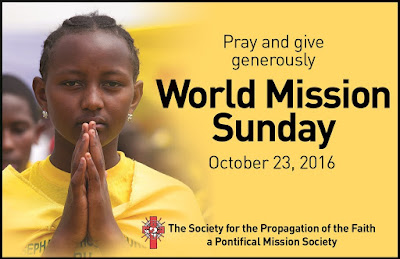GENERAL AUDIENCE POPE FRANCIS 5 OCTOBER 2016
GENERAL AUDIENCE POPE
FRANCIS
St Peter's Square
Wednesday, 5 October 2016
Wednesday, 5 October 2016
Apostolic Journey to
Georgia and Azerbaijan
Dear Brothers and
Sisters, Good morning!
This past weekend I made an Apostolic
Journey to Georgia and Azerbaijan. I thank the Lord for granting me this
visit, and I renew the expression of my gratitude to the civil and religious
authorities of these two countries, in particular to the Patriarch of All
Georgia Ilia II — his testimony did my heart and soul a power of good — and to
the Sheikh of the Muslims of the Caucasus. I extend my fraternal gratitude to
the Bishops, priests, men and women religious and all the faithful who let me
feel their warm affection.
This journey was the
continuation and completion of that made to Armenia in the month of June.
In this way I was able — thanks be to God — to implement the plan to visit all
three of these countries in the Caucasus, so as to confirm the Catholic Church
that lives in them, and to encourage the journey of those peoples towards peace
and brotherhood. It also highlighted the two mottos of this last trip: “Pax
vobis” for the visit to Georgia, and “We are all brothers” for the visit to
Azerbaijan.
Both of these countries have
historical, cultural and religious roots that are very ancient, but at the same
time they are experiencing a new phase: in fact, both are celebrating the 25th
anniversary of their independence this year, having been under the Soviet
regime for a large part of the 20th century. And in this phase they are
encountering many difficulties in various spheres of social life. The Catholic
Church is called to be present, to be near, especially as a sign of charity and
human advancement; and she seeks to do so in communion with the other Churches
and Christian Communities and in dialogue with the other religious communities,
in the certainty that God is the Father of everyone and that we are brothers
and sisters.
In Georgia, this mission
naturally passes through cooperation with our Orthodox brothers, who make up
the vast majority of the population. Therefore, it was highly significant that
when I arrived at Tbilisi Airport, along with the President of the Republic,
the Venerable Patriarch Ilia II was there to receive me. My meeting with him
that afternoon was moving, as well as my visit to the Patriarchal Cathedral the
following day, where the relic of the tunic of Christ, a symbol of the Church’s
unity, is venerated. This unity is reinforced by the blood of so many martyrs
of the different Christian denominations. Among the most tried of communities
is the Assyrian-Chaldean, with whom, in Tbilisi, I experienced an intense
moment of prayer for peace in Syria, Iraq and throughout the Middle East.
The Mass with the Catholic
faithful of Georgia — Latin, Armenian and Assyrian-Chaldean — was celebrated in
memory of St Thérèse of the Child Jesus, Patroness of Missions: she reminds us
that the real mission is never proselytism, but rather attraction to Christ,
beginning with strong union with Him in prayer, adoration and concrete acts of
charity, which is service to Jesus present in the least of our brothers. What
the men and women religious do — those whom I met in Tbilisi and then in Baku —
they do with prayer and charitable and promotional works. I encouraged them to
be steadfast in the faith, with remembrance, courage and hope. Then there are
the Christian families: how precious is their presence of welcome,
accompaniment, discernment and integration into the community!
This style of evangelical
presence as a seed of the Kingdom of God is, if possible, even more necessary
in Azerbaijan, where the majority of the population is Muslim, and where
Catholics number only a few hundred, but thanks be to God, they have good
relations with everyone, and in particular maintain close fraternal ties with
Orthodox Christians. For this reason, in Baku, the capital of Azerbaijan, we
experienced two moments that the faith is able to exercise in a balanced way:
the Eucharist and the interreligious meeting. The Eucharist with the small
Catholic community, where the Spirit harmonizes the various languages and gives
the strength of witness; and this communion in Christ does not impede, but
rather, it impels us to seek encounter and dialogue with all those who believe
in God, so as to build together a more just and fraternal world. In this
perspective, while addressing the Authorities of Azerbaijan, I hoped that the
open questions might find good solutions and that all of the peoples of the
Caucasus may live in peace and mutual respect.
May God bless Armenia, Georgia
and Azerbaijan, and accompany the journey of His holy pilgrim people in those
countries.
Special greetings:
Finally, a thought goes to young
people, the sick and newlyweds. The month of
October is the month of missions, in which we are invited to pray intensely to
the Virgin Mary, Queen of Missions: dear young people, be
missionaries of the Gospel in your environment with the mercy and tenderness of
Jesus; dear sick people, offer your suffering for the conversion of
those who are distant and indifferent; and you, dear newlyweds, be
missionaries in your family, proclaiming by Word and example the Gospel of
salvation.
I greet the English-speaking
pilgrims and visitors taking part in today’s Audience, particularly those from
England, Scotland, Ireland, Norway, Australia, China, Indonesia, Malaysia, the
Philippines and the United States of America. Upon all of you, I invoke the
mercy and peace of the Lord, praying that you may share these gifts with all
whom you will encounter. May God
bless you!
© Copyright - Libreria Editrice Vaticana


















